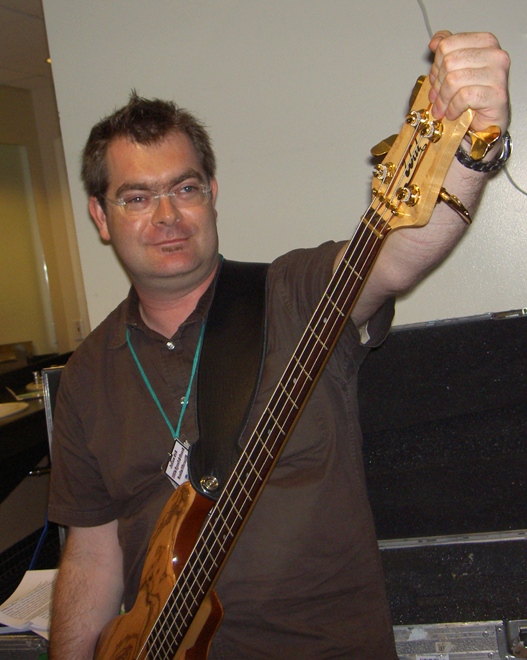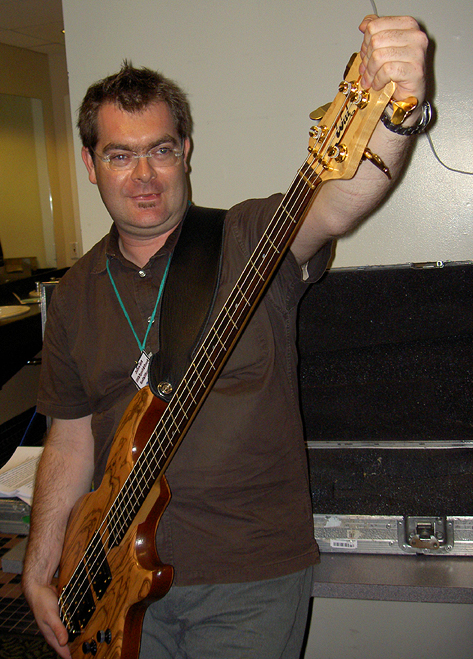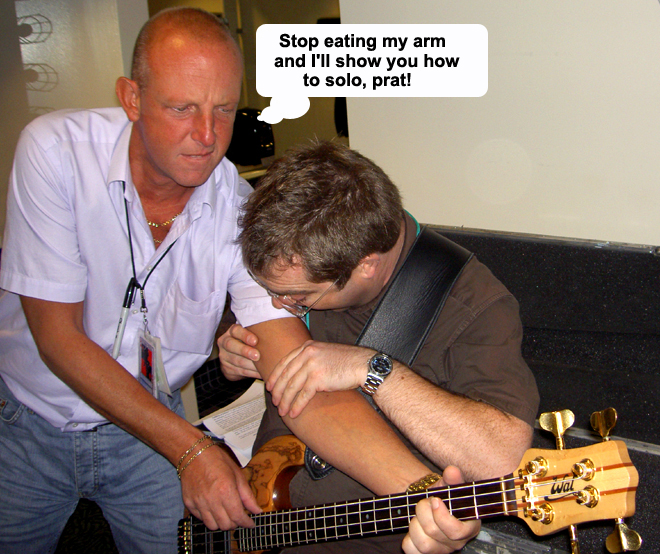A Few Words With...Jonathan Noyce
Since 1995, Jonathan Noyce has been holding down the bass spot in Jethro Tull. No easy feat filling the shoes of those who came before: Cornick, Hammond, Glascock, Williams, Pegg, and Ian Anderson himself. Noyce has done it with ease and a quiet charm. Not so long ago, I sat down with Noyce to learn a bit about the man behind the low frequencies...

PS: What was your very first paying gig?
JN: First paying gig, it was probably for a function band in England, where I'm from, where I grew up. I was still at home so maybe when I was 17 or 18. I got a call from a function band leader called Nick Cotton & he had a function band so we used to scoot off to mysterious places and play all kinds of stuff ranging from chart music to something contemporary at that time - Tina Turner to sort of Motown. There was no rehearsal and it was sight-reading music and it was frightening, so it was a very good experience. Yeah, they were frightening because everybody was older than me and I didn't particularly feel comfortable with them at all... but that's another story.
PS: Were you playing bass at that time, or percussion?
JN: That was bass. That was my first paid bass gig, but before that I did paid percussion work. Classical percussion, snare drums and timps, xylophones and all that kind of stuff, in symphony orchestras, when I was 16 or 17.
PS: Now as someone with a background in percussion, what attracted you to play the bass?
JN: Wow, I don't know, maybe it was the rhythmical thing. And I think also, a practical reason. My parents lived in a very old house, and still live in a very old house, and having a drum kit was never really an option. There was no where to put it and play it. So I ended up with a bass guitar. I was attracted to the bass guitar through an English group called Level 42. Who were very popular, they managed to blend in popularity with some sort of musical dexterity. Early '92... Mark King.
PS: Yes, great player!
JN: Yeah, he used to be a drummer in fact. So I was attracted by that. The way he played was very percussive, very rhythmic. I think it was a few years later that I adopted a more melodic approach to the bass as opposed to a percussive one. That was where my interest in bass started.
PS: What's the road between there and hooking up with David Palmer?
JN: Funny enough there is a connection between David Palmer and Level 42. Paul Crawford, who was Level 42's manager, briefly managed David. And it was Paul who called me, he was a very nice chap. I was a student at the Royal Academy of Music at the time. So that was the connection and that was 1992 - 93.
PS: And how was Palmer to work for?
JN: He was OK. I mean it was a reading gig. He was doing classical rock, so it was a rock band with orchestra and it was reading. So fortunately I had my head buried in the page. Didn't have to think about it so much so. Everything I did with David was always in some ridiculous place - be it in the middle of Luxembourg or in Caracas - all these crazy places, crazy gigs. Heaven knows how he managed to get these ridiculous rock gigs. David - he's a very flamboyant character, and most of the time I had my head buried in a page.
PS: I supposed is a few years after that is when in fact I first met you on Ian's Divinities tour at the Beacon Theatre at that time. Which by the way, it was one of the only times a crowd was so bad that it distracted me from the show.
JN: In what way were they bad?
PS: Ian came out and said we're going to play Divinities then take a break & play Tull stuff. Every quiet moment during Divinities, there was a man screaming "Aqualung!!!" Through the entire show, even after Aqualung was played, he still screamed it. It was very distracting.
JN: Oh, yeah, we had an audience like that last night, there's always a couple. I know what you're talking about. Last night there was a couple of people - drunks - kind of doing the same thing, so I sympathize with you on that. Actually I remember it being a very raucous gig. A sort of testosterone, drenched evening. I remember standing in the wings and this guttural roar like a football match.
PS: How did you get that gig?
JN: The connection was Martin. I mean...there were Tull connections before that, David Palmer being the obvious one. And also the chap who played drums with David named Mark Parnell, who very briefly played with Tull for 2 shows. But it was Martin who had the actual connection between me and Tull. I played on Martin's second solo album and everything had happened very quickly after that. Ian heard Martin's album and there was a vacancy for bass. Ian called me, so I went down to audition and ended up doing the tour after that so it was fun.
PS: Since then, have you played the standup bass again?
JN: Funnily enough yes! I did the tour on a borrowed Ampeg 1960's double bass, which was a nightmare. I mean, again, good training, you know. Finished the tour, bought a double bass. I bought the thing and promptly put it back in it's case for a while. Ironically it's sessions that I get called to do on it. Which is fun because I don't have to worry too much about practicing every day. It's quite a cumbersome instrument. Like a regular double bass, you do have to keep yourself together to get a good sound out of it.
PS: What's different? Is it the intonation?
JN: It's physical. It's a bigger instrument. particularly with an acoustic double bass. To move air, you gotta play it the right way, which is with power. But you can't hit the thing - you have to coax it out of the string, it's quite something.
PS: I've always thought it looked like a real finger buster.
JN: It's finger busters, it's wrist busters, it's upper arm-busting. It's really physical and before we went on the road with Divinities, I did actually go to training. I like it, it's nice to come back to occasionally. If I had more time, if there were 32 hours in the day and I didn't have to sleep, it'd be nice to spend a bit more time at it.

PS: Now that takes us into Tull. Working in a band like Jethro Tull, it strikes me that a lot of the material is fairly tightly arranged.
JN: Yes.
PS: When you go through any average tour, are there some songs that allow you more expressive leeway than others, or do you pretty much stick to what the album arrangement was?
JN: Yeah, it does vary. It varies by the song. Some things demand more of a set part approach because that's the kind of arrangement they do. An example of that would be something like Cheap Day Return, where I play 95% of the same thing every night. If you deviate away from a part in a song like that it really blurs the focus of something that's that crafted. It's much more powerful to stay within something that's crafted like that. In other parts of the show there's a bit more leeway. We're not an improvising band, we don't bluff it, we don't make it up as we go along. You can do that in other kinds of music like that, but I think that the power is playing something in an ensemble way, but surprisingly it does vary from night to night. Obviously I notice it, and the guys, everybody in the band. I was surprised to find out that fans notice it as well. We have a lot of fans who follow us around the United States and they'll come to 10 shows in a row and they notice. That's one of the reasons why they keep coming back - because they notice it, so that's nice.
The vibe changes every night. Every tour is different you know, every time you'd like to get it different sometimes, once every moment in a tour. Every 8 years or so is a struggle. For whatever reason, you're finding a struggle. You're all fighting for common ground and just trying to strike that resonance together which is what it's really all about. Occasionally you just can't get it, but most of the time it's very resonant, and it's resonant in a different way. Every tour has it's own particular character.
PS: What attracted you to want to be in this band? To want to stay in this band?
JN: I think it's the challenge. The level of musicianship is very high, the diversity in the repertoire of Jethro Tull, and it's a very good job. I was fortunate enough to be offered the opportunity to join the band, so I took it, and it was in an area which I had never worked in before. I played classical music but my background as an electric player had been in soul, funk music in contemporary music in London. My background was blacker, if you like, than what I'm doing now.
PS: Is there any commonality between the two?
JN: Oh there is, yes. Not the same way that there is with Curtis Mayfield for instance. There came a point after I joined the band that I kind of sat down and I wondered what it was that I could bring to the table, but also bring to the bass. I think that everybody that has been in the band has had their own thing. Glenn was quite archaic you know and quite wild and that's what he brought to it . John Glascock had his thing ....
PS: John was a muscular player - I always looked at him that way.
JN: Yeah! I love him. He's a great player, I loved the way he played. Everybody who played in the band has obviously influenced me because I've had to study their approaches. The thing that I decided that I could really do was actually bring something that was heavier - just, you know, groovier. A bit of the Motown thing without it being Motown.
PS: It seems in Tull that every bassist comes in with a totally different approach than the person before them.
JN: Yeah, absolutely. I guess I have the benefit of being able to take bits of what went in, roll it up into a ball, in a brief summary. But I think now I'm less conscious of Dave's approach, of John's approach - I'm just going to play. I'm conscious of the way it sounds now, at this moment.
PS: What is your current rig?
JN: Well, since day one, since I started to know about equipment, SWR was a brand of amplifier that I really liked - very kind of high end. It has a great deal of character as well, has a growl to it. So I'm using a largish SWR rig. 2 4 X 10 cabinets and an SM 900 amplifier which is a big amplifier. I'm using an Avalon bass DI. I have a DI box designed by them which essentially connects the bass to the PA but it also adds a color, a presence - like having good olive oil ....
PS: Is it something you need to fiddle with or is it just their presets?
JN: There are presets on it, actually, but I have it flat. I'm a great believer in leaving things flat. So that's that side of it. My bass is a Wal bass, which I had made for me last year, which it's a fabulous, a fabulous instrument. I also have some pedals by EBS. I have everything that they've got. They're really very sturdy, great quality, I just...you know, I like quality. Planet Waves cables, D'Addario strings, everything is good. It just seems that combination of stuff really is resonant, its lovely. It's really great to stand in front of - you don't have to do too much about it.
PS: How is the feel of the Wal as opposed to a Fender P bass?
JN: Well they're quite similar in many ways. The Wal is more akin to, it's kind of a cross between a Jazz - yeah, a Precision / Jazz kind of thing. It's a chunky thing - it's probably a bit heavier. The P bass is the master, that's the king. I always thought, if you sit down with a good P bass, you could make a good sound with it. That's the master.

PS: Do you have anything coming up session-wise outside of the band?
JN:I did an album with a girl called Leanne Harte. Who's a young Irish talented singer, songwriter. She's young, she's 17, she's talented and she's Irish - does electric so it's rock. So it was a trio with myself, and Darrin Mooney, a great friend of mine who's Primal Scream's drummer. Gary Moore's album started, and there's more to do on that, and I have my own sort of ongoing project as well.
PS: Is there any Tull stuff you've been itching to play that the band hasn't gotten around to yet?
JN: I'm very curious about A Passion Play, I never heard it. I've heard a few little bits & pieces and that sounds quite interesting. Bits of Warchild, Minstrel In The Gallery. The track Minstrel In The Gallery is one of the things I think is outstanding. There's the track Warchild which has got that crazy chorus, which I just thought - angular and really great, great writing. It's a very broad, multi-headed beast, the Tull repertoire.
PS: And finally: 6 albums you never get tired of listening to.
JN: Oh man, right. There's gotta be a Beatles one in there. Abbey Road, or White Album. Miles Davis. It's gotta be My Funny Valentine. Bach: St. Matthew Passion. Squarepusher: Go Plastic. Marvin Gaye: What's Going On. I love Marvin Gaye. I would say Fulfillingness' First Finale by Stevie Wonder.
PS: I think you have hit on 6 albums that no one has mentioned other than the White Album.
JN: Really? I grew up on the White Album. When I was 3 I had the White Album on record.
###
Table Of Contents
Contact



